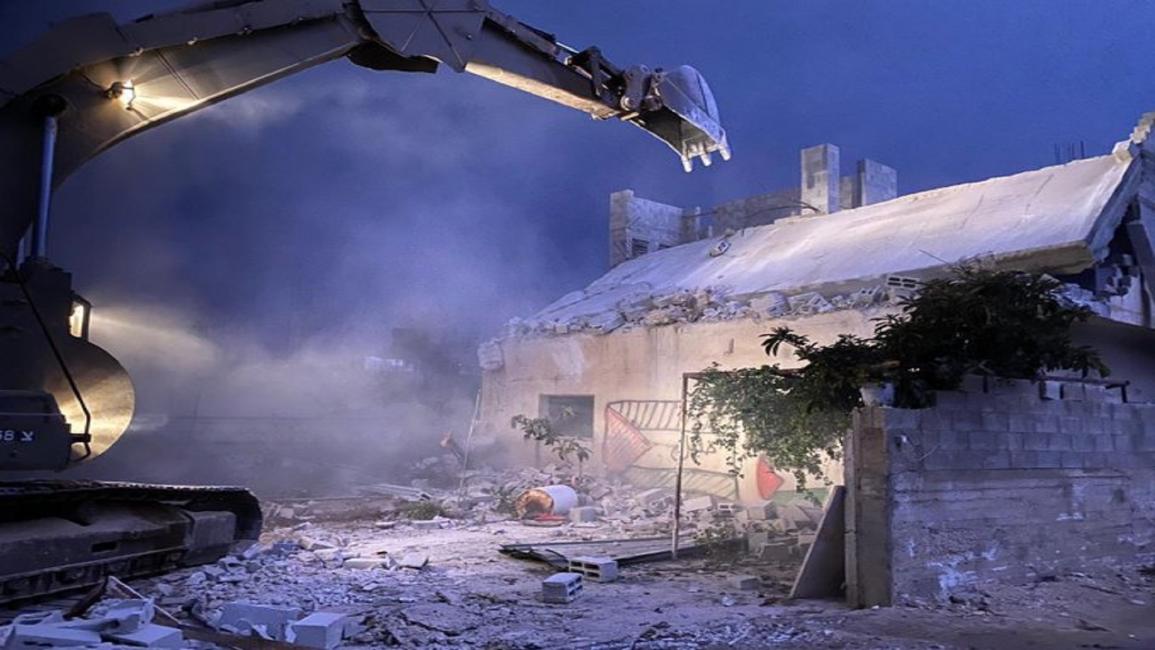
Ref: 114/2020
Date: 02 November 2020
Time: 09:00 GMT
Israeli occupation forces continue to practice its collective punishment policy against the families of Palestinians accused of being involved in acts of resistance against IOF or settlers. On Sunday evening, 01 November 2020, IOF demolished Khalil Abdul Khaliq Mohammed Dwaikat’s family home in Rujeib, southeastern Nablus, northern West Bank. Dwaikat is currently imprisoned by Israel.
According to PCHR’s follow-up, at approximately 22:30 on Sunday, IOF, accompanied by several military vehicles, including a bulldozer, raided Rujeib town; IOF soldiers spread in the northern part of the town, mounted the roofs of several houses in the area and blocked the entrance to Dwaikat’s (46) family home, while randomly shooting tear gas canisters. A group of soldiers raided the house to execute a demolition decision that the family were previously notified of; the decision was issued by the Supreme Court on 25 October 2020, and granted the family until 18:00 on Sunday, 01 November 2020 to vacate. IOF accuses Dwaikat, who has been detained since 26 August 2020, of committing a stab-attack in Petah Tikva in Israel, where rabbi Shai Ohayon was killed.
At approximately 23:30, the forces began demolishing the two-story house (150 sqm). The house was home for Dwaikat’s wife, Najwa Khairy, and his five daughters, four of whom are children. They also uprooted 15 olive trees and other fruitful trees and demolished a retaining wall (length: 25 m; height: 2 m). The forces withdrew at approximately 02:00 on Monday, amidst heavy shooting of tear gas canisters. After their withdrawal, clashes erupted between IOF soldiers and Palestinians, during which several Palestinians suffocated due to tear gas inhalation and received treatment in the field.
It should be noted that IOF had previously raided the family house on 26 August 2020, interrogated both Dwaikat’s wife and his brother-in-law regarding Dwaikat and his work. At the time, a member of IOF’s Engineering Unit took the house measurements in a prelude to its demolition. IOF informed the family of the demolition decision verbally before withdrawing. The following day, Dwaikat’s brother, Khaled, submitted a complaint with HaMoked, who submitted a complaint with the Supreme Court, and the demolition decision was frozen within a month. On 25 October 2020, HaMoked and the family were shocked to learn that the Court had convened and issued a decision to demolish the house with one week notice to the family to evacuate, i.e. until the evening of the day the demolition was executed.
PCHR, once again, condemns this crime and the demolition of houses, which falls under the Israeli collective punishment policy that is systematically applied against Palestinians with the support of the Israeli judiciary. PCHR recalls that Article 33 of the Fourth Geneva Convention relative to the Protection of Civilian Persons in Time of War, explicitly prohibits collective punishment and stipulates that, “No protected person may be punished for an offence he or she has not personally committed. Collective penalties and likewise all measures of intimidation or of terrorism are prohibited.”
Hence, PCHR reiterates its call for an immediate intervention by the international community to end the Israeli occupation’s crimes, and reiterates its call upon the High Contracting Parties to the Fourth Geneva Convention to uphold their duties as per Article 1 of GCIV, where they commit to “respect and to ensure respect for the present Convention in all circumstances.” PCHR further reminds the High Contracting Parties of their obligations pursuant to Article 146 to prosecute persons alleged to have committed grave breaches of the Convention, noting that such breaches are considered war crimes as per Article 147 of GCIV, and their obligation under Protocol I additional to the Convention to guarantee the right to protection for Palestinian civilians in the occupied territory.